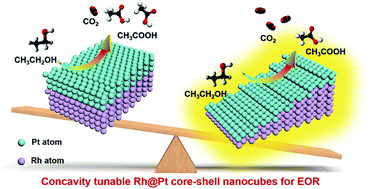Facilitating the C–C bond cleavage on sub-10 nm concavity-tunable Rh@Pt core–shell nanocubes for efficient ethanol electrooxidation†
Abstract
Sluggish C–C bond cleavage during the ethanol oxidation reaction (EOR) in acidic media results in a lowered energy yield and gravely hinders the commercialization of direct ethanol fuel cells. Here we report an elaborate synthesis of sub-10 nm concavity-tunable Rh@Pt core–shell nanocubes with an engineered Rh–Pt interface and Pt atomic surface steps to facilitate the C–C bond cleavage in the EOR. Using a microsyringe pump, the surface concavity of the Rh@Pt core–shell nanocubes is successfully manipulated through kinetically adjusting the ratio of the atom deposition rate and surface diffusion rate (Vdep./Vdiff.) during the overgrowth process. Compared to the samples with shallow surface concavity and a flat surface, the deeper concaved Rh@Pt core–shell nanocubes possess richer surface Pt atomic steps and exhibit a greater enhancement in EOR catalysis, achieving mass activity and specific activity that are 3.74 times and 6.89 times higher than those of the state-of-the-art Pt/C catalysts, respectively. Electrochemical in situ FTIR studies indicate that the Rh–Pt interfacial interaction and the surface Pt atomic steps on the Rh@Pt concave nanocubes can effectively facilitate the C–C bond cleavage towards the complete oxidation of ethanol to CO2.



 Please wait while we load your content...
Please wait while we load your content...